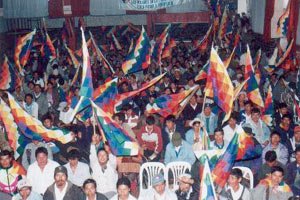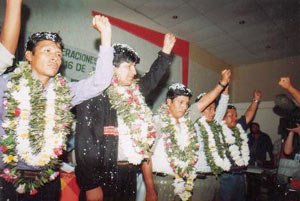


A Witch-Hunt Against Coca Farmers
Bolivian “justice” punishes the poor, protects the powerful
By Alex Contreras Baspineiro
Special to The Narco News Bulletin
September 30, 2003
government and the North American empire”
Evo Morales Ayma,
National Congressman and Coca Producers’ Leader
The forces of “justice” have put several coca growers and their leaders – who the Bolivian government and US anti-drug policy consider “key figures in the popular movement” – directly in their sights under the pretext of combating terrorism, coca and narco-trafficking.
 Cocaleros gather at the last coca producers’ congress Photo D.R. 2003 Alex Contreras |
Last April, in a “media show” that the United States’ own embassy organized, a Colombian citizen was detained and four Bolivians were accused of carrying out terrorist acts in cooperation with the Colombian National Liberation Army (ELN in its Spanish acronym).
Case by Case
On September 4, the criminal court of the town of Sacaba passed down the maximum sentence –30 years without the possibility of parole – to Luciano Cruz Tola, Javier Lorocachi Condori, Fredy Gonzales, Florencio Avendaño, Luis Gonzales, Felipe Carballo, Ciriaco Centellas, and Mario Cacharro. All eight were accused of assassinating army officer Juan Lazarte Alvardo and Sargent Julio Veramendi in September, 2000.
Thirty years in prison is the maximum sentence Bolivian law allows for any crime. The ex-dictator Luis García Meza, for example, is now completing the same sentence.
Most cocaleros believe the prisoners to be innocent. Two of them were not even in the area where the conflict occurred. Three of them claimed they were subjected to physical and psychological torture. Both ruling-party and opposition congressmen criticized the ruling, saying that the court had not even followed the most minimal due process, and had not established guilt before the sentencing began.
Congressman and cocalero leader Evo Morales Ayma criticized the court’s secrecy in its ruling on the eight men. That ruling has now been appealed. “We, the poor who are defending our lives, are victims of prison, persecution, and abuse. Politicians, as corrupt and murderous as President Gonzalo Sánchez de Lozada or Defense Minister Carlos Sánchez Berzaín, are rewarded for massacring the people, when they should be the ones receiving 30 years in prison,” he said. According to Morales, the Bolivian justice system serves only the forces of the US empire and the ruling faction of the Bolivian government.
Seventy-one people have died in political violence during the first thirteen months of the Sánchez de Lozada administration. Most died from gunshot wounds inflicted by uniformed police and soldiers. And there are more deaths unaccounted for. There has not been a single arrest or trial. There is only impunity.
Sixteen more acusations
 The principal popular leaders of the Chipare region Photo D.R. 2003 Alex Contreras |
Feliciano Mamani, general secretary of the Federation of the Tropic; Leonilda Zurita, head of the Bolivian National Peasant-Farmer Federation; Osvaldo Toco, executive member of the United Federation of Labor Unions; Justino Reyes, leader of the Chimoré Federation, and other cocalero leaders are accused of damaging private property and threatening farmers involved in alternative development projects.
According to the accused leaders, the government hopes to behead and divide their organizations, when in fact all this will produce is more unity among the trade unions and federations.
Coca and “Terrorism”
In early September, Chimoré city councilor Juana Quispe was detained and accused of terrorist activities, possession of explosives, organized crime, and of having links with the ELN in Colombia. On September 14, a public prosecutor, in a move orchestrated for the media, accused Quispe of having planted explosives in the Chimoré Catholic Seminary. There was no proof for any of this.
Quispe and her five-month-old baby were detained in the Chimoré military base and a prison in La Paz, the capital, for nearly a week. She has now been provisionally released.
Juana Quispe’s is not an isolated case. Months earlier, the same tactic was attempted against union activist Margarita Terán. The authorities accused Terán of planning the assassination of two officers. Terán was confined to the San Sebastián prison in Cochabamba despite no evidence linking her to the crime. She is now also enjoying a provisional release from custody.
Leonilda Zurita, the main cocalero leader from the Bartolina Sisa Bolivian Federation of Women Peasant-Farmers, is also accused of participating in the assassination of two officers. But airplane tickets show that on the day of the crime she was at a seminar in the Czech capital of Prague.
And so justice marches on.
US Pressure
On April 10, 2003, in El Alto, near the capital of La Paz, in a spectacular political “anti-terrorist” operation, Francisco “Pacho” Cortés – a Colombian citizen – was detained, along with two Bolivian cocaleros and two family members of one of the cocaleros. Although it looked like a set-up ordered by the US embassy, the commercial media offered a sensationalistic defense of the government’s images and statements, without even a pretense of critical journalism.
Interior Minister José Luis Harb admitted to US participation in the operation: “There are treaties, agreements, and joint actions for the fight against terrorism. Terrorist activities have an extra-continental nature, and as such we have agreements with many countries, not just with the United States.”
The dramatic operation quickly fell apart in a series of contradictions: first the men were accused of involvement with the Revolutionary Armed Forced of Colombia (FARC), then of links to the ELN (the two guerrilla armies are generally hostile to one another), and then of links to narco-trafficking. The government accused “Pacho” of being a guerrilla soldier, but then of being a human rights activist, and much more.
In this case, the two family members of the one cocalero – both children – won their freedom. “Pacho,” Claudio Ramírez, (the ex-mayor of La Asunta, in the Yungas region), and Chapare cocalero leader Carmelo Peñaranda are now in the Chonchocoro maximum-security prison in La Paz.
Despite all these legal attacks, the cocalero movement demonstrated in Bolivia’s “Gas War” – a struggle against the sale of the nation’s gas reserves to the United States – an opposition movement that is more alive, strong and united than ever. About 10,000 coca producers, both men and women, arrived in Cochabamba on September 19. They were demanding an immediate solution not only to the problem of coca and alternative development, but for land, territory, foreign policy, and reclamation of the nation’s gas and other natural resources.
Evo Morales, the principal leader of the Bolivian social movement, said that if these injustices against the cocaleros, small farmers, indigenous, and representatives of the social movements continue, it could produce “a civil war.”
Alex Contreras Baspineiro, alexadcb@hotmail.com, also writes for the magazine www.alainet.org, the Bolpress news agency, produces radio programs and coordinates a school for political and labor organizing in Cochabamba, Bolivia.
Lea Ud. el Artículo en Español
- The Fund for Authentic Journalism
For more Narco News, click here.




